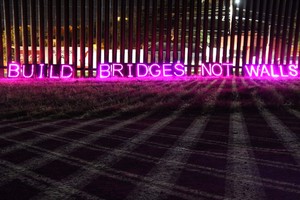 Photo by Chris Smiley
Photo by Chris Smiley
by Jonathan Engle, Santa Fe Chapter
“Governments are instituted among men, deriving their just powers from the consent of the governed.” The Declaration of Independence is clear regarding the basis of legitimate governmental authority. What’s less clear is the meaning of the term “consent.” Is consent still implied without transparency or informed public debate? Although we are currently experiencing a trend towards whistleblowing, adversarial journalism, and other efforts aimed at increasing public awareness of intentionally obscured or hidden policies, many remain unknown. From October 7th-9th, six Johnnies attended an event on the U.S./Mexico border to learn more about one manifestation of bureaucratic brutality.
The Department of Defense established the School of the Americas (SOA) in Panama in 1946 to facilitate the training of security personnel throughout Latin America with the goal of protecting U.S. foreign interests. In 1961, as a result of the Cold War, the school’s focus shifted to anti-communist counterinsurgency training. Panama expelled the SOA in 1984, forcing the school’s relocation to Ft. Benning, Georgia. Former Panamanian President Jorge Illueca called the SOA “the biggest base for destabilization in Latin America.” As the cold war ended, the SOA declared a new enemy: drugs. After a change in focus did little to repair the SOA’s tarnished reputation, a change in name appeared necessary. Enter the Western Hemisphere Institute for Security Cooperation (WHINSEC): slick new name, same brutal tactics.
The SOA has trained an estimated 700-2,000 soldiers, police, and civilians annually, totaling over 64,000 graduates since inception, in subjects such as commando tactics, counterinsurgency techniques, sniper training, psychological warfare, military intelligence, and interrogation techniques. The school later incorporated human rights training into the curriculum, but only after facing heavy criticism. The identities of trainers and students remain classified, with the 9th Circuit Court of Appeals affirming the government’s right to secrecy just this year. In the dissenting opinion, Judge Paul Watford said, "Without knowing the actual names of those allowed to attend the Institute, the public has no way of independently verifying if students are properly vetted before enrolling at the Institute, or whether after graduating they engage in human rights abuses in their home countries.”
Awareness of the actions of SOA graduates began to spread in the 1970s and 80s, especially during the Salvadoran Civil War. After continued speech against the human rights violations in El Salvador, Catholic Archbishop Oscar Romero was assassinated while giving mass in 1980. Later that year, an unmarked grave was uncovered, exposing the bodies of three American Catholic Maryknoll Sisters and a lay missionary. The situation kept escalating, and following the 1989 murder of six Jesuit priests, their co-worker, and her 15 year old daughter in El Salvador, Father Roy Bourgeois formed the School of Americas Watch (SOAW) with the goal to close the SOA and to change U.S. foreign policy in Latin America. SOAW's strategies include education of the public, lobbying Congress, and participating in creative, nonviolent resistance. In 1993, the United Nations Truth Commission Report on El Salvador was released, confirming the involvement of SOA graduates in extra-judicial/death squad killings, forced disappearances, and massacres of peasants.
Fr. Bourgeois has stated, “Most of the courses revolve around what they call "counter-insurgency warfare." Who are the "insurgents?" We have to ask that question.” They are the poor for whom the long night of 500 years, since the arrival of the Spaniards, has not ended. They are the people in Latin America who call for reform, for the possibility of choosing for themselves, for the freedom from the whims of colonial powers. On the one hand, they are peasants whose land has been stolen—those wretched beings who walk hungry and naked on once-green fields of a devastated continent, all those whose dreams have been stolen by the ferocious hunger of colonialism. On the other, they are health care workers, human rights advocates, labor organizers, educators, and student activists.
Since 1990, SOAW has held annual vigils at the gates of Ft. Benning, Georgia to protest the SOA, drawing thousands of participants. This year, the vigil was moved to Nogales, Arizona/Sonora, to draw attention to the continued flow of Latin American asylum seekers, immigration policies, and the increased militarization of our borders. Included in the program of events was a demonstration at the Eloy detention center, a march across the international border, educational workshops, musical performances, testimonials, and theatrical performances.

